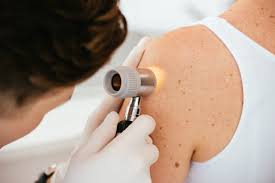Skin cancer screening represents a proactive approach to detecting potentially dangerous skin conditions before they progress. Regular screenings can identify abnormal growths, suspicious moles, and early-stage cancers when treatment options are most effective. Understanding what dermatology offers and how screening works helps patients make informed decisions about their skin health.
What Is Dermatology?
Dermatology is a medical specialty focused on diagnosing and treating conditions that affect the skin, hair, and nails. Dermatologists possess expertise in identifying a wide range of skin conditions, from common rashes to complex, cancerous growths. The field encompasses both medical and cosmetic treatments for skin-related concerns. Dermatologists diagnose conditions such as eczema, psoriasis, acne, and skin cancer while also providing treatments for aesthetic improvements.
What Are the Available Services?
Dermatology practices offer comprehensive skin examinations that include full-body assessments and targeted evaluations of specific areas of concern. Biopsy services are performed when suspicious lesions require tissue sampling for laboratory analysis and diagnosis. Additional services may include cryotherapy for removing benign growths, surgical excision of cancerous lesions, and follow-up monitoring programs. Dermatologists also offer educational resources to help patients understand proper skin self-examination techniques.
What Is Skin Cancer?
Skin cancer occurs when skin cells undergo genetic mutations that cause uncontrolled growth and division. The three primary types include basal cell carcinoma, squamous cell carcinoma, and melanoma, each with distinct characteristics and treatment approaches. Basal cell carcinoma typically appears as small, shiny bumps or patches that may bleed easily, while squamous cell carcinoma often presents as rough, scaly patches or open sores.
Melanoma represents the most serious form of skin cancer, developing in the pigment-producing cells called melanocytes. This type can appear as new moles or changes in existing moles, often displaying irregular borders, multiple colors, or asymmetrical shapes. Early detection significantly improves treatment outcomes for all types of skin cancer, making regular screening a valuable preventive measure.
What Happens During a Screening?
The screening appointment begins with a review of your medical history, which includes questions about your family history of skin cancer, previous sun exposure, and any changes in existing moles or skin lesions. The dermatologist then conducts a systematic examination of the entire skin surface, including areas typically not exposed to sunlight. This thorough approach allows for the detection of abnormalities in unexpected locations.
During the physical examination, the dermatologist assesses suspicious areas with magnification and specialized lighting. The practitioner may photograph specific lesions for documentation and future comparison during follow-up visits. If any areas appear suspicious, the dermatologist may recommend a biopsy, which involves removing a small tissue sample for laboratory testing.
What Are the Benefits?
Regular skin cancer screening provides the opportunity for early detection when treatment options are most effective. Early-stage skin cancers often require simple outpatient procedures, while advanced cancers may necessitate more extensive treatment approaches. The screening process also allows patients to learn about their risk factors and receive personalized recommendations for prevention.
Professional screening can identify changes that patients may overlook during self-examinations. Dermatologists receive specialized training in recognizing subtle signs of malignancy that may not be apparent to untrained observers. Regular screenings also establish baseline documentation of existing moles and skin features, making it easier to detect future changes.
Visit a Dermatologist Today
Skin cancer screening represents a straightforward approach to protecting your long-term health through early detection and prevention. The process provides valuable information about your skin health while addressing any concerns about suspicious growths or changes in existing moles. Schedule a consultation with a qualified dermatologist to discuss your individual screening needs and develop an appropriate prevention plan.
